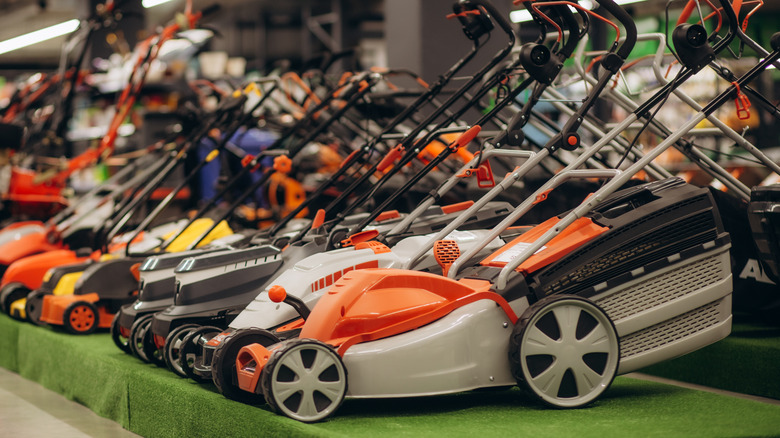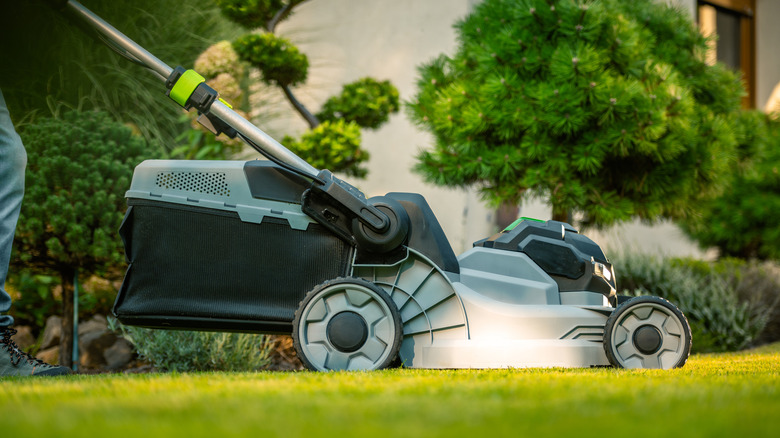What You Need To Know Before Buying An Electric Lawn Mower
Electric lawn mowers may seem like a fairly recent introduction, but in fact, corded electric mowers have been around for almost a hundred years. There are plenty of new models available, and if you have a modest-sized yard, you can pick up budget-friendly examples for under $120.00. However, what most people probably think of when you talk about buying an electric lawn mower are cordless (battery-powered) models, and with increased focus on emissions and the environment, they have become very popular.
There are hundreds of different machines available, from lightweight lawn mowers weighing under 30 pounds to giant, zero-turn ride-on models. Many manufacturers claim their electric lawn mowers can rival gas-powered machines in terms of performance while being cheaper to run and easier to look after. It's true that buyers of 10 of the best battery-powered lawn mowers, based on reviews, are largely very positive about their purchases. Okay, but what do you actually need to know before buying an electric lawn mower?
Things like deck size, cutting height, and maneuverability are important, but are common to all machines, regardless of how they are powered. Where electric machines differ are things like run time and charging time. There is also the question of whether electric lawn mowers offer features that gas-powered alternatives do not.
The key specifications to look for on an electric lawn mower
It's a given that electric lawn mowers, whether corded or cordless, have easy starting. You don't have to worry about things like gas, oil, and spark plugs, so maintenance is a breeze. While there are questions about how batteries are produced, it's widely agreed that they are less polluting than gas motor emissions.
Batteries have two key specifications. Voltage (V) tells you absolute power, while Amp hours (Ah) are a bit like fuel: if two batteries have the same voltage, but one has higher Ah (let's say 8Ah rather than 4Ah), then the former will run for roughly twice as long as the latter between charges. If you're looking for ways to mow your lawn more efficiently, higher Ah means less stopping and starting.
It's also worth checking how long you'll need to wait for batteries to recharge. You can, of course, buy spare batteries, but they're not cheap. Higher Ah models typically take longer, though some electric lawn mower chargers are faster than others. One other statistic you may find helpful, which a number of manufacturers provide, is how much lawn area the mower should cut per charge. You might also check if the batteries are compatible with other garden machinery you own, potentially reducing your overall costs.
Why an electric lawn mower may not be for you
Lawn mower batteries can last anywhere from 3 to 10 years, depending on their type. It's important to know how to look after them properly. Run times will decrease, and eventually the battery will stop taking a charge completely and need to be replaced. As already indicated, that can be a substantial cost. A well-maintained gas lawn mower could outlast those batteries, and while there are ongoing maintenance costs, they are unlikely to add up to the same overall.
In an ideal world, electric mowers should cut grass as well as gas-powered rivals. That said, electric mowers tend to generate less torque, so thick grass will drain the battery more quickly. The same is true for lawns on a slope. To some extent, whether it's worth getting an electric lawn mower will depend on the size of your yard and the terrain.
Not too long ago, you could argue that electric lawn mowers didn't have the power of their gas counterparts, but many now offer equivalent performance while being easier to live with. There are always lawn mower brands to steer clear of, but checking specifications, reputation, warranty, and customer feedback should tell you all you need to know before you bring one home.


